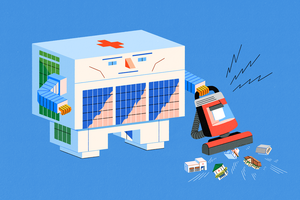Policy Oct 7, 2013
Looking Good for the Regulators
Efforts to avoid regulator scrutiny come with downsides
No one wants to make a mistake—particularly not one that will be painfully evident to his or her boss the next day, week, or quarterly review. But while making a mistake is bad, people tend to avoid the mere appearance of making a mistake just as vigilantly.
Employees are often focused on what are known as career concerns. Since promotions, raises, or other benefits frequently depend not just on a person’s performance but on what her boss thinks about her abilities based on that performance, employees consider their professional reputation when making decisions. The familiar “cover your posterior” strategy kicks in: people stick with the safe option rather than taking a smart risk that could go poorly and make them seem less competent.
Career Concerns for Entire Companies?
Meghan Busse, an associate professor of management and strategy at the Kellogg School of Management, wanted to find out if career concerns might play out on a larger scale. Can the desire to cover one’s backside alter the actions of entire companies the way it changes the behavior of individual employees?
Busse and her colleagues, Severin Borenstein at the University of California Berkeley and Ryan Kellogg at the University of Michigan, looked at firms in the natural gas industry. ComEd, PG&E, and other local utilities companies buy gas and deliver it to consumers; regulatory bodies called public utilities commissions oversee the companies, ensuring that they buy enough gas to keep consumers stocked, and at a reasonable price. If a commission thinks a local utility company is behaving imprudently—paying too much for gas, for instance—it can call the utility before a regulatory review, much as a boss might call an underperforming employee in for a performance review.
During a review, Busse explains, regulators “are essentially going to Monday morning quarterback and decide if the distributor made the right choice in any particular circumstance. That’s going be painful and unpleasant because in 20/20 hindsight, everything looks clearer.” The possibility of a review might foster career concerns, thought Busse, encouraging companies to focus less on making the smartest decisions—even if they come with risks—and more on avoiding actions that might look like mistakes.
Avoiding the Appearance of Imprudence
So Busse and her colleagues investigated how utilities buy and sell gas. Local utilities buy much of their gas through long-term contracts. To handle short-term changes in demand, the firms can either buy more gas or sell their surplus on two timescales: during the last week of each month, in what is called the “forward market,” or the day before they need it, in what is called the “spot market.”
If career concerns are guiding utilities’ strategies, Busse hypothesized, the situation they would most want to avoid would be selling their extra gas in the forward market, only to face a spike in demand and have to buy it back—at a much higher price—in the spot market. This would be especially true in tight markets, when demand, and prices, are high. Even if profiting from a surplus seems like a good idea at the time, selling it off only to buy it back for more counts as imprudent behavior that can trigger a review. It would be easy for regulators to home in on the utility’s misstep during that review, Busse explains. “They can point the finger and say: You made a mistake. You made the wrong judgment about how much gas you were going to need.”
But if utilities refrain from selling gas on the forward market and still have to buy more on the higher-priced spot market, this does not necessarily look like a mistake. Sometimes there are limits to what can be purchased on the forward market, so perhaps the utility had simply been unable to buy as much as it needed. “That’s a plausible story because that’s sometimes true,” Busse says. “The regulator can’t say you messed up, because you haven’t taken an action they can point to and know for sure is a mistake.”
When the markets were tight, they saw a forward price premium.
Busse and her colleagues analyzed spot and forward market prices and trading volume data from more than 100 local natural gas markets across the U.S. from February 1993 to March 2008. With these data, they could not look directly at whether individual companies were acting as expected. They could, however, look for larger trends that would result from many utilities behaving this way: when demand is high, there should be fewer trades and higher prices during the forward market than would be expected based on the performance of the spot market, evidence that utilities were hesitant to sell their gas and risk a mistake.
After conducting regression-based analyses of the data, the researchers indeed found this evidence. When the markets were tight, they saw a forward price premium such that a $1 rise in the expected spot price would cause a $1.25 to $1.27 rise in the expected forward price. A higher spot price was also linked to a decrease in trading volume: that same $1 increase in expected spot price leads to an 8.9% decrease in trading volume in the forward market. Other potential explanations for the trends—such as companies paying a premium to lock in a supply of gas or to avoid the risk of paying a still higher price on the spot market—cannot explain the entire pattern of results.
Inefficient Markets
These trends in company behavior could make whole markets less efficient. “You have inefficient outcomes when you have somebody who really needs gas, and is willing to pay a high price, [but] can’t get someone to sell them the gas at that price,” Busse says. If a local distributor in one region likely has more than enough gas to see them through the month, they would, in most markets, sell the extra gas to a distributor in a region where it is getting colder and demand for gas is high. But if the market is tight, the first distributor might not sell—just in case its own area gets cold and it has to buy back gas at a high price. “They’re not willing to sell because they don’t want to take on the risk that they’re going to end up needing it and then be in this really unpleasant prudency review,” she says.
This result built on the earlier research that showed individual career concerns—employees doing what is best for their own professional reputations—could lead to inefficient choices within a company. But as far as the researchers know, this is the first paper that demonstrates how career concerns can actually produce inefficient markets.
The same thing likely happens in other sectors as well, Busse suspects. “There’s a new input supplier, but purchasing managers don’t buy from them because they don’t want to be the ones who tried out something new and derailed the production process,” Busse says. “Maybe this is actually a better input, but nobody will try it. And therefore what would be a market innovation doesn’t happen because nobody’s willing to take the risk and go first.”
Borenstein, Severin, Meghan R. Busse, Ryan Kellogg. 2012. “Career Concerns, Inaction and Market Efficiency: Evidence from Utility Regulation.” The Journal of Industrial Economics. 60(2): 220–248.



